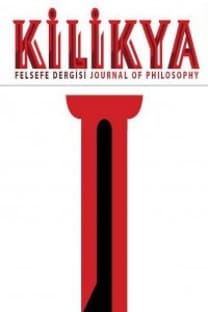Yeniçağ’daki Spiritüel Cevher Anlayışına De La Mettrie’nin İtirazı
Yeniçağ Felsefesi, Ontoloji, Cevher Problemi, Maddî Monizm, Tıbbî Materyalizm
The Objection of De La Mettrie on the Spiritual Substance Opinion in the Early Modern Age
Early Modern Philosophy, Ontology, Problem of Substance, Material Monism, Medical Materialism,
___
- Adjukiewicz, K. (1994). Felsefeye Giriş (A. Cevizci, Çev.). Ankara: Gündoğan Yayınevi.
- Berkeley, G. (1843). A Treatise concerning the Principles of Human Knowledge, in The Works of George Berkeley, vol. I, London: Thomas Tegg, https://books.google.com.tr/books?id=yKU3AAAAMAAJ
- Carneiro de Oliveira Franco Donatelli, M. (2013). “Filosofia e medicina em La Mettrie”, in Scientiæ studia, v. 11, n. 4, São Paulo, https://www.scielo.br/pdf/ss/v11n4/v11n4a06.pdf
- Crick, F. (2005). Şaşırtan Varsayım (S. Say, Çev.). Ankara: Tübitak Yayınları.
- De La Mettrie, J. O. (1796a). Abrégé des Systèmes, in Œuvres Philosophiques De La Mettrie, tome premier, Paris: chez Charles Tutot, https://books.google.com.tr/books?id=DnxCUdXZXHcC&printsec=frontcover&redir_esc=y#v=onepage&q&f=false
- De La Mettrie, J. O. (1796b). Traité de l’âme, in Œuvres Philosophiques De La Mettrie, tome premier, Paris: chez Charles Tutot, https://books.google.com.tr/books?id=DnxCUdXZXHcC&printsec=frontcover&redir_esc=y#v=onepage&q&f=false
- De La Mettrie, J. O. (2006). L’Homme Machine, http://www.ali-aix-salon.com/La_mettrie_homme_machine.pdf
- Descartes, R. (1661). Méditations Métaphysiques, (Duc de Luynes, Fr. Çev.), Paris, https://gallica.bnf.fr/ark:/12148/bpt6k164903n/f104.image
- Descartes, R. (1966). Discours de la Méthode. Paris: Garnier-Flammarion.
- Hobbes, T. (1811). Human Nature, in The English Works of Thomas Hobbes, vol. IV, London: John Bohn et alii, https://archive.org/details/englishworksofth029531mbp
- Hobbes, T. (1824). “Objections aux Méditations” in Œuvres de Descartes, publiées par Victor Cousin, tome: I, Paris: chez F. G. Levrault, https://gallica.bnf.fr/ark:/12148/bpt6k94258n.texteImage
- Locke, J. (1825). An Essay Concerning Human Understanding, https://archive.org/details/humanunderstandi00lockuoft/page/n27/mode/2up
- Papalık, Index librorum prohibitorum, (erişim tarihi: 17.05.2020): https://sourcebooks.fordham.edu/mod/indexlibrorum.asp
- Ryle, G. (2009). The Concept of Mind. London and New York: Routledge Press.
- Vartanian, A. (1960). La Metrrie’s L’Homme Machine, Princeton: Princeton University Press.
- Yayın Aralığı: 2
- Başlangıç: 2014
- Yayıncı: Eray Yağanak
Immanuel Kant’ın Canlı Doğa Sorununa Teleolojik Yaklaşımının İncelenmesi
Heideggerci Sahih Kendiliğe Giden Yolda Zaman, Varlık ve Aşkınlığın Önemi
Feminist Tarihyazımında Soykütüksel Yaklaşım: Eleştirel Tarih
Kadavranın Donuk Metamorfozunda İzler Bakış ve Müstehcen-Bakış
Kapitalist Toplumda Özgürleşme: Georges Bataille Düşüncesinde Vazgeçme ve Harcama Olarak Egemenlik
Port-Royal Mantığı’nda Tasımsal Geçerliliğin Saptanışı
Phaidon’da Ruhun Ölümsüzlüğü: Karşıtların Döngüselliği Argümanı (70C-72A)
Nagel’ın Düşüncesinin Öncüleri: Farrell ve Sprigge
Rawls ve Nozick Bireysel Haklar, Tercihler ve Yetenekler Üzerine
